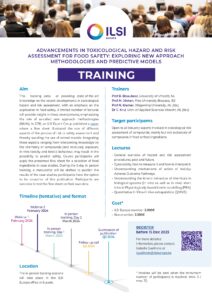
In the ever-evolving landscape of modern science and research, staying ahead of the curve is a necessity. The field of toxicological hazard and risk assessment for Food Safety is experiencing a shift towards New Approach Methodologies (NAMs) - replacement technologies for use in assessing chemical or drug toxicity-, which are increasingly being used for regulatory decision making by agencies worldwide.
Professionals across various industries are becoming keen to embrace these new approaches because of their potential to reliably and efficiently produce toxicological information while reducing traditional animal testing. In response to this burgeoning demand, ILSI Europe is excited to announce the launch of a comprehensive training course designed to empower industry experts with the knowledge and skills needed to navigate NAMs and predictive models effectively.

Aim of the course
The course aims at providing state-of-the-art knowledge on the recent developments in toxicological hazard and risk assessment, with an emphasis on the application in food safety. A limited number of lectures will provide insights in these developments, emphasizing the role of so-called New Approach Methodologies (NAMs). In a paper published by an expert group of ILSI Europe in 2016, a flow sheet was presented where the role of different aspects of the process of risk or safety assessment, avoiding the use of animal models. Integrating these aspects, ranging from interpreting knowledge on the chemistry of compounds (of mixtures), exposure, in vitro toxicity and kinetic behaviour, may result in the possibility to predict safety. Course participants will apply the presented flow sheet for a selection of food ingredients in case studies. During the 2-day intensive, in person training a manuscript with be drafted to publish the results of the case studies; Participants have the option to be co-author of this publication.
Dates announced!
The training course includes:
- Two online webinars on 28 May 2024 (2pm-4pm) and 30 May 2024 (2pm-4pm).
- Two days of in-person training at ILSI Europe's office in Brussels on 2 & 3 July 2024 (full day).
- A follow up online call on 29 August 2024 (2pm-4pm).
Register before 30 April 2024!
Don't miss this opportunity to enhance your knowledge, gain new skills and network with professionals from the field of toxicology and risk assessment.
Trainers:
- Prof B. Blaauboer, University Of Utrecht, NL
- Prof M. Vinken, Free University Brussels, BE
- Prof N. Kramer, Wagening University, NL (tbc)
- Dr C. Krul, University of Applied Sciences of Utrecht, NL (tbc)
Lectures:
- General overview of hazard and risk assessment procedures, past and future.
- Cytotoxicity, how to measure it and how to interpret it
- Understanding mechanisms of action of toxicity: Adverse Outcome Pathways
- Understanding the kinetic behaviour of chemicals in biological systems (in vitro as well as in vivo): short intro in Physiologically-based kinetic modelling (PBK)
- Quantitative In Vitro-In Vivo extrapolation (QIVIVE).
- Case studies: Participants will apply the flow sheet for food and ingredients. If you wish to test the scheme on your own data, you are welcome to bring them.
Participants
The course is open to all industry experts, regulatory scientists, and researchers involved in toxicological risk assessment of compounds, mainly but not exclusively of compounds in food or food ingredients.
Seats: Minimum 5 / Maximum 15.
Cost
- Participant from an ILSI Europe member company: 2.000€
- Participant from a non-member company: 2.500€
The cost includes the training materials, the meals for the in-person training days (2 lunches and 1 dinner), and the publication fee. Travel and accommodation will not be covered.
Invoices will be sent once the minimum number of participants is reached (min. 5) and course is confirmed.
Share the news!
Feel free to share this training one-pager in your network!
